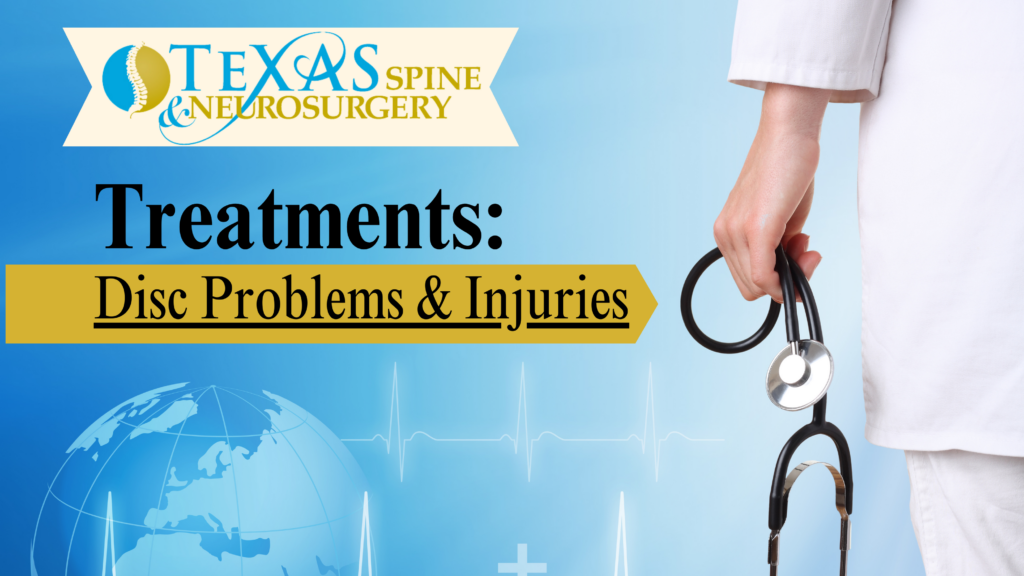Hear from People Just Like You – Patient Testimonials

Herniated Discs
Herniated Discs – Back pain, leg pain, arm pain, or weakness of the upper and lower extremity muscles may be signs of a herniated disc. When an intervertebral disc becomes herniated, the cushion that sits between the spinal vertebra is pushed outside its normal position. Since the spinal nerves are very close to the edge of these spinal discs, a herniated disc can easily compress the nerve root, causing radiating pain down the arm or leg.
Possible Causes
As the spinal disc loses elasticity over time, injury or even normal daily living may cause it to rupture. If the disc ruptures and a portion of the spinal disc is pushed outside its normal boundary, this is known as a herniated disc. As a herniated disc swells out from between the vertebrae, the spinal nerves and spinal cord may become pinched. There is typically a small amount of additional space around the spinal cord and spinal nerves, however, if enough of the herniated disc is pushed out of place, then these structures may be squeezed together. The nerves may become impinged when the disc herniates and pushes out. A herniated disc may occur abruptly as a result of a fall or an accident or may occur gradually with a recurring strain of the spine. In some cases, people who experience a herniated disc already have spinal stenosis, a problem that brings about the narrowing of the space around the spinal cord and spinal nerves. With a herniated disc, the space for the nerves is further reduced, and compression of the nerve results.
Possible Symptoms
- Pain radiating down the arms or legs.
- Unusual sensations such as tingling, numbness, or pins and needles.
- Muscle weakness.
- Bowel problems.*
- Bladder problems.*
- Numbness in the genital area.*
* You should see your doctor immediately if you have problems urinating, having bowel movements, or if you have numbness around your genitals.
Treatment
Options for treatment include:
- Medications
- Lumbar bracing
- Surgery
- Physical therapy
- Occupational therapy
- Steroid injections
- TENS units
- Chiropractic’s
- Pain management
- Acupuncture
- Massage therapy
Contact us for more information or to schedule an appointment.
Degenerative Disc Disease
Degenerative Disc Disease – As we age, the discs in our spine tend to degenerate. Normally, as in our youth, these discs are hydrated with water. As we age, they become dehydrated. The drying out of the discs causes the discs to shrink. They lose height and their ability to cushion the spine. This can result in pain in the neck and back from grinding of the vertebral bodies. Over time, degenerative disc disease can result in disc herniation, spinal stenosis, and bone spurs.
Possible Causes
As part of the normal aging process, our spinal discs break down or degenerate. Sometimes, this results in degenerative disc disease. This is because the loss of fluid in your discs reduces the ability of the discs to act as shock absorbers. The reduction in the fluid also results in thinner discs and a narrower distance between the vertebrae. Small tears or splits in the outer layer (annulus or capsule) of the disc may cause the jellylike material inside the disc (nucleus) to be forced out through the tears or cracks in the capsule. This may cause the disc to bulge, break open or break into fragments. People who smoke, do heavy physical work, and who are obese are more likely to have symptoms of degenerative disc disease. An abrupt injury leading to a herniated disc (such as a fall) may also begin the degeneration process.
Possible Symptoms
- Back or neck pain
- Pain which radiates into the arms, buttocks or legs.
- Pain may worsen with movements such as bending over, reaching up, or twisting
- A popping sensation in the back
- A sensation of having “sand” in the back
- A grinding sound or feeling with movement.
Treatment
Ice or heat may be used to relieve pain. Nonsteroidal anti-inflammatory drugs, including aspirin, ibuprofen, or naproxen sodium, may also be used to treat the pain resulting from inflammation related to a disc problem or injury. In some cases, acetaminophen may also help relieve pain. More aggressive treatment depends on whether the damaged disc has resulted in other conditions, such as osteoarthritis, a herniated disc, or spinal stenosis. Physical therapy and exercises for strengthening and stretching the back are often recommended. In some cases, surgical treatment may be recommended.
Contact us for more information or to schedule an appointment.